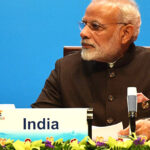
The Indo-Pacific region has seen a rise in political instability in recent years. The Trump administration and China have been at loggerheads, through the WHO, in formulating a global approach to slowing the spread of COVID-19. The region has experienced a rise in human rights violations, evidenced by the bitter treatment of the Rohingya in Myanmar, China’s persecution of Uyghur Muslims in Xinjiang, and authoritarian crackdowns in Thailand and Cambodia. The Indo-Pacific has also witnessed China’s growing assertiveness in the South China Sea, East China Sea, and along the Indo-China border, eliciting a defensive posture from regional powers such as Australia, Japan, and India.

In full view of political and human rights crises in the Indo-Pacific, the UN has remained silent. It has failed to enact reforms to its major organs, such as the Security Council. It has failed to bring meaningful reform to the Human Rights Council, which remains populated by serial violators, including China and Iran, as well as its inability to find its voice on rights violations against Muslim populations in China, Myanmar, and India. The UN has remained “concerned” over India’s recent Citizenship Amendment Act and subsequent Hindu violence toward Muslims, China’s housing of Uyghur Muslims, or the plight of the Rohingya, but has not insisted through Special Procedures that independent investigators gain exclusive access to the most sensitive areas. China, like other autocratic regimes in the region, has repeatedly denied or stalled invitations to UN experts wanting to conduct official visits.
Despite these shortcomings, the incoming Biden administration represents an opportunity to reinvigorate ties between the US and the UN. Doing so could catalyze economic growth and provide stability in the Indo-Pacific. Regionwide, there is no shortage of challenges that need concrete solutions, including institutional reforms—both at the Security Council and the Human Rights Council—and a more robust climate change agenda.
Past and present American administrations have discussed reform at the United Nations, chiefly in the Security Council. Static since 1945, the aging body needs to be made fit for purpose in the modern era. To accomplish this, additional permanent members should be added—with two equally qualified candidates in the Indo-Pacific. India and Japan have lobbied for years with limited support. India has been an active participant in UN peacekeeping operations around the globe and Japan has been a leading contributor of development assistance (ODA) for decades. Their constant presence on the Security Council, combined with changes to veto powers, would add two vital allies capable of defending the international order and keeping the peace. Adding a third new permanent member from Africa would win concessions from the African continent—which has contributed proposals in the past that have received little recognition in the General Assembly. One of the principle strengths of the United Nations is its commitment to the equality of states, vested in Article 2 of the UN Charter. The Security Council is a forum where Great Powers exert influence on global affairs, yet to maintain that influence, the US needs a proactive Security Council that can both provide support to multilateral initiatives and advance its interests, as well as hold human rights violators and autocratic regimes accountable.
On the human rights front, the UN could facilitate reform proposals for the Human Rights Council. The Trump administration walked away from the Council in 2018, with former UN Ambassador Nikki Haley calling the body a “hypocritical and self-serving organization.” The Secretary-General António Guterres and Michelle Bachelet, the UN High Commissioner for Human Rights should advocate the reform of the Council by mandating the norm of taking into account the contribution of potential candidates to the Council, as well as their voluntary pledges and commitments. While the US is sure to return to the Human Rights Council under a Biden administration, it should back a proposal that would help eliminate states with poor human rights records, such as limiting Council seats to just one term or increasing the threshold to win a seat from a simple plurality to a two-thirds majority. Abandoning the Human Rights Council, rather than advocating for its reform is short-sighted thinking—a decision that left American allies in the Indo-Pacific, like Japan and Australia, in the lurch.
Climate change is another area of cooperation where the United Nations can engage with the Biden administration. Biden has already signaled as much by appointing former Secretary of State John Kerry as his climate envoy. While Asia’s economic engine now fuels the global economy, it is responsible for more than 50% of global greenhouse gasses through rapid industrialization. The Indo-Pacific needs to make climate change a higher priority, particularly in light of recent natural disasters. The US should address a number of climate vulnerabilities by dramatically upscaling humanitarian and disaster response exercises, as seen in the Cobra Gold and Tiger Triumph exercises with Thailand and India. Climate change needs to be viewed, including by the US as a security threat. Global temperature changes facilitate seawater rise, create storm surges, and strain fisheries. Climate change pressures put stress on bilateral relations, particularly in ASEAN, which are at risk of violent naval confrontations as a result of competing territorial claims in the South China Sea. The Biden administration would be wise to adopt a coherent national strategy on climate change, a glaring hole in Trump’s anti-science doctrine, which ignored Department of Defense warnings, particularly on the Indo-Pacific in 2019.
A focus on environmental initiatives would not only bolster Washington’s Indo-Pacific Strategy, but other states in the region such as Japan, Australia, and India with Free and Open Indo-Pacific visions and mutual environmental concerns. China need not be excluded from the group; the 2nd Belt Road Forum recently demonstrated Beijing is placing greater emphasis on the environment in BRI projects. Promoting crosswalks through the convening power of the UN can kill two birds with one stone, contributing to climate change cooperation in the Indo-Pacific while moving the China-US rivalry away from a zero-sum approach. The UN should avail itself of this opportunity. The UN could provide cooperation mechanisms to mitigate climate change impacts in the Mekong Delta, the South China Sea and South Asia. Piggybacking on pre-existing initiatives such as the US-Mekong Partnership or Australia’s Partnerships for Recovery in ASEAN and the Southeast Asian region may be a template for expanded multilateral cooperation.
To reinvigorate its partnership, America and the UN must proactively adopt policies that resonate with the Biden administration’s multilateral and internationalist inclinations. Institutional reform, human rights, and climate change cooperation are key areas of synergy in the broader Indo-Pacific.
Co-authored with Dr. Stephen Nagy, a senior associate professor at the International Christian University in Tokyo, distinguished fellow with Canada’s Asia Pacific Foundation, fellow at the Canadian Global Affairs Institute (CGAI) and a visiting fellow with the Japan Institute for International Affairs (JIIA). Twitter handle: @nagystephen1.







